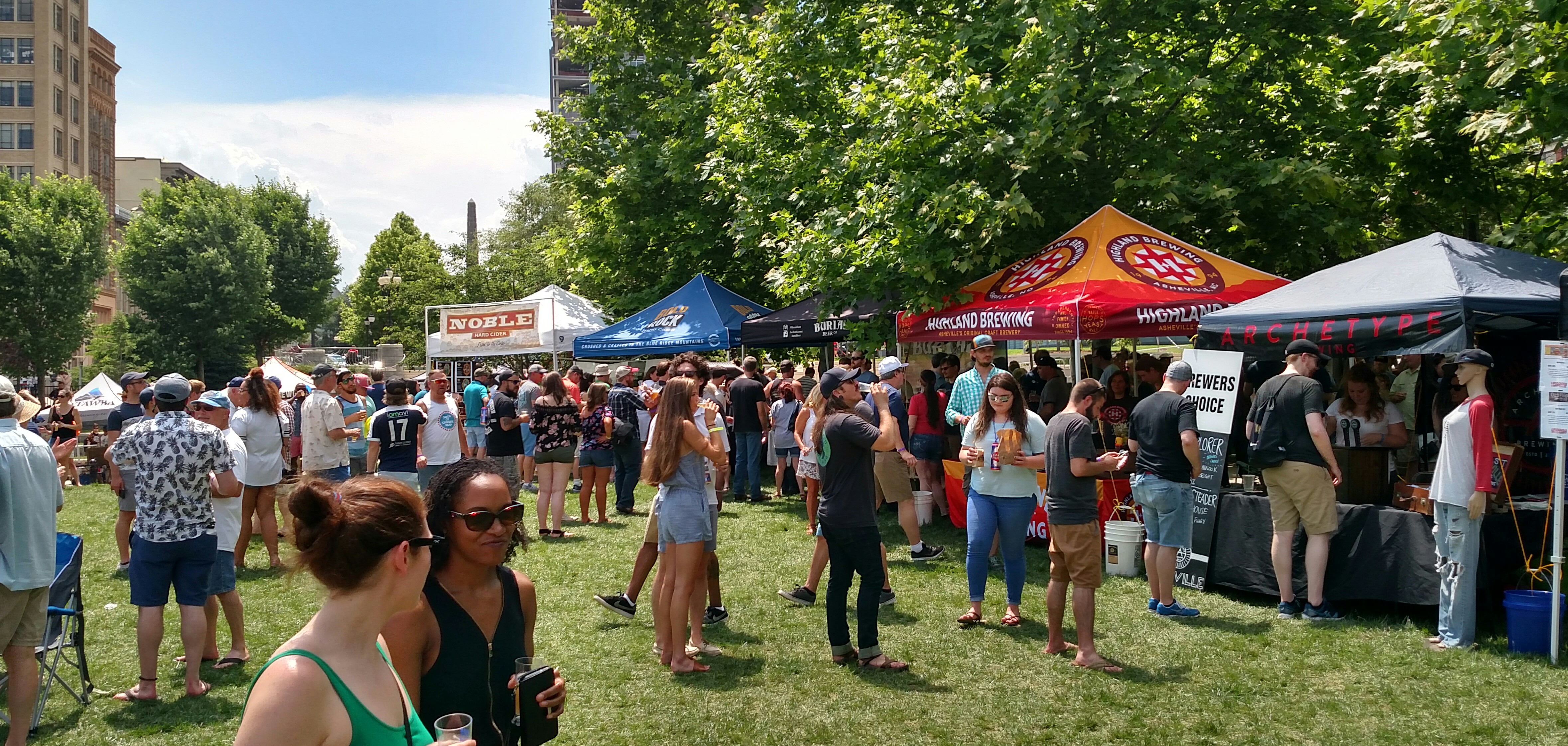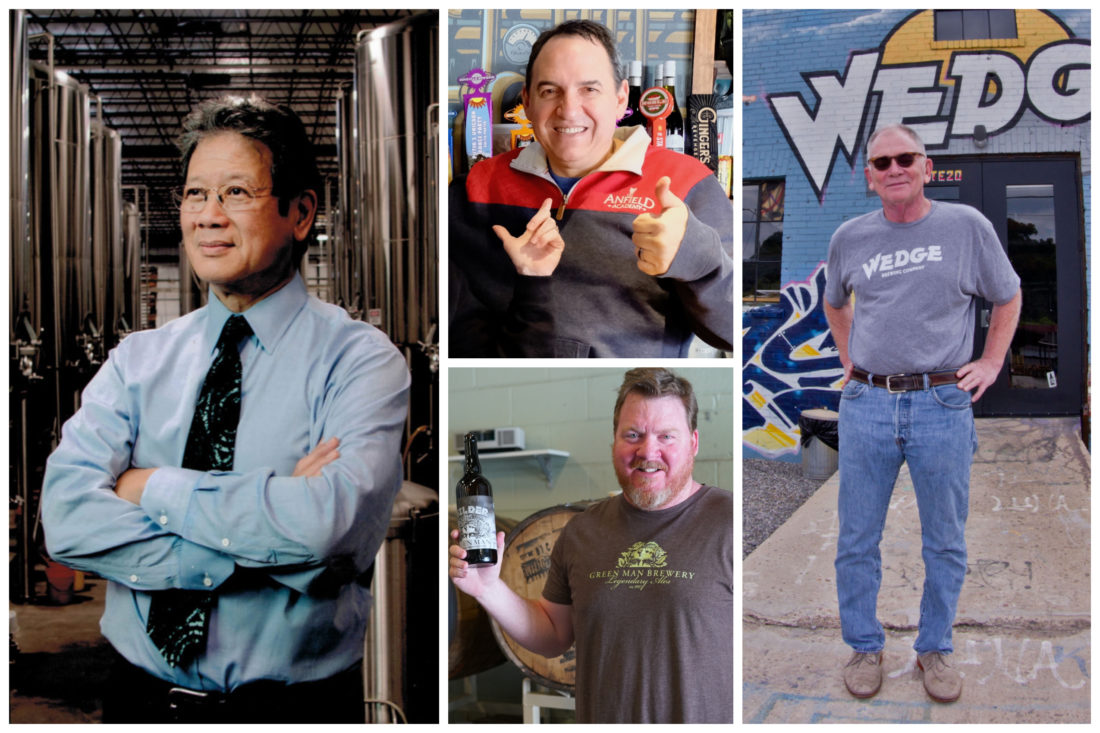Just how many breweries can Asheville support? The question has been asked almost since the start of the local craft brewing scene and is not easily answered.
With three dozen breweries in Buncombe County alone — most of them in Asheville — and more than twice that number scattered around the mountains of Western North Carolina, it’s also a topic that’s not going away anytime soon, especially as more breweries have opened in the increasingly competitive market. At least two new Asheville breweries are slated to open in 2019: DSSOLVR on Lexington Avenue and a brewing operation at the new 12 Bones Smokehouse barbecue restaurant in South Asheville.
Veteran opinions
A survey of a few of Asheville’s legacy brewery owners reveals differing thoughts about whether the region has reached a point where oversaturation is a business concern. Some industry stalwarts say the brewery limit may have already been reached or will soon hit that level, while others believe there remains room for more players.
In Asheville, no one has been on the craft beer scene longer than Oscar Wong, founder of Highland Brewing Co., the city’s first craft brewery. From its start 25 years ago in the basement of the Barley’s Taproom and Pizzeria building on Biltmore Avenue, Highland has seen significant growth and expansion. Its beer is now made at a much larger brewery in East Asheville and sold across the Southeast — and Wong is well aware of the competition.
“I would say that we are close [to the limit that can be supported], if we are not there,” he says. As for more breweries joining the scene, he thinks the continued interest is rooted in people who have a passion for brewing and a dream to make beer for a living. “We live in a free country, and we are free to try,” he says.
Wong believes that Highland’s business has been impacted by the growing number of competitors. Though he notes Highland sales remain strong, the brewery has discontinued distribution to Kentucky, Ohio and Alabama, but stills sells in North Carolina, South Carolina, Virginia, Tennessee, Georgia and Florida.
“About two years ago, [sales] flattened out for sure. But it started to pick back up in 2018,” Wong says. “In some ways, [increased competition] has taken some of our business, but it has opened up the industry. More and more people are aware of the craft industry.”
When he opened Highland in 1994, Wong thought Asheville might grow to include two or three total breweries. Instead, the local industry continued to expand. He identifies Asheville winning the 2009 Beer City USA online poll (tying with Portland, Ore.) as helping bring the city national attention and leading to more brewery growth, which has been sustained by a steady stream of craft beer tourists.
At Asheville Brewing Co., President Mike Rangel has changed his mind about how many breweries the city can support. “If you had asked me four years ago, I would have said, ‘Absolutely we are at saturation,'” he says. “But in Asheville, for every five breweries that open, we also open another hotel. As long as the caravans of tourists keep coming up the mountain [breweries will keep opening].”
But as new establishments arise, Rangel thinks that Asheville is nearing the point where more breweries will begin to close. “It seems that the neighborhood pubs are disappearing, and they’re being replaced by the neighborhood breweries. A lot of the breweries that are opening now, you’re not going to see in Ingles. They are perfectly happy just making beer [for their neighborhoods],” he says. “But the bubble has burst if you are making a mediocre product. If you’re not creative or original, the writing is on the wall for you.”
A strong understanding of business is likewise key for any new brewery owner, says Tim Schaller, owner of the two Wedge Brewing Co. locations along the French Broad River.
“It’s obviously getting harder [to succeed],” he says. “I do worry about how many can actually get cans on store shelves, but it’s an exciting, wonderful business to be in. I can’t blame people for trying. I think some of us did it naively, and probably some still are. I don’t know how long you can hang out without a strong business plan and the funding.”
Dennis Thies, owner of Green Man Brewery, believes the market can still take on new breweries, even as he echoes Rangel’s sentiments that increased local beer options are hurting on-premise bar business across town.
“The newer breweries that are opening, their model is to sell over the bar without distribution, for the most part,” Thies says. “When was the last time you saw a production brewery open [here]? That’s a real brewery. Have we seen a max on production breweries? Yes. But not for [smaller breweries]. I don’t think it’s tapped out. You will see more of them opening and more bars closing.”
Thies adds that sales of packaged beers at grocery stores are mostly being made to locals, not tourists. “That’s local support that we’re so grateful for. The tourists don’t go to Ingles for the most part,” he says, noting that sales to out-of-towners are being sliced up as more product is sold in tasting rooms. “But that’s OK. I just hope the newer guys have the excitement that I enjoyed in the first years of owning Green Man. When I got into it, there were just five of us.”

Opened and closed
The market for new breweries remains strong, says Joe Rowland, owner of Nantahala Brewing Co. of Bryson City and president of the nonprofit Asheville Brewers Alliance, which represents local breweries.
“I think the industry has evolved,” Rowland says. “It’s not just a niche industry anymore. You’ve got some breweries that are going to excel, and you’ve got some that are going to struggle. That’s the evolution of anything.
“If you were talking about the tech industry or the dot-com industry of 15 years ago,” he continues, “there are ones that have continued to thrive when there were so many out there. And then there are ones that either the concept didn’t work out or the challenges were too great. I think there are a lot more [breweries] still coming.”
But their success could depend on the type of business they want to create, he adds. “There’s a limit on the number of large production breweries that we can sustain. And I just don’t mean Sierra Nevada [Brewing Co.] or New Belgium [Brewing Co.], but the breweries that are trying to sustain on distribution. There’s only so much room on [store] shelves.”
Buoying Rowland’s optimism is the small number of Asheville breweries that have shut down. After Craggie Brewing Co. closed in late 2012, it was six years before the next such casualty. Lexington Avenue Brewery revealed it would cease operations at the end of 2018, followed by nearby Habitat Brewing Co., which closed in February.
Owners of those businesses had varying reasons for calling it a day. “After nine years at LAB and with a new baby at home, I’m looking for a change,” LAB owner Mike Healy said in a press release issued when the closing was announced. The location, which Healy still owns, is being transformed into the CANarchy Collaboratory, to be operated by the collective that runs Oskar Blues Brewery and Cigar City Brewing.
Habitat on Broadway spread itself thin by trying to run both a brewery and an event space, according to Jen Addis, who owned Habitat with her husband, Matt Addis. “In spite of the great support from the local neighborhoods, it has been tough to encourage people down Broadway from Lexington,” she told Xpress in early 2019. “Broadway will grow over the next few years, but our timing was off.” West Asheville’s Archetype Brewing Co. has taken over that location as a taproom and expansion of its barrel aging operation and has plans to add a pilot batch-brewing system and a sour program.
From a national perspective, Julia Herz says brewery saturation is difficult to measure. The craft beer program director at the Brewers Association trade organization in Boulder, Colo., reports that more than 7,300 craft breweries operate nationally and that in 2017, just under 1,000 breweries opened while 165 closed.
“You can ask if another restaurant should open down the street,” Herz says. As for breweries, “Absolutely [they can successfully open] if they differentiate themselves, provide a world-class experience and make world-class beer. That said, it’s a much more competitive market than several years ago. It’s a great time to be a beer lover, but it’s harder than ever to be a brewery owner.”
The two-part Brewery Saturation Series continues in next week’s issue, exploring some of Asheville’s newest breweries’ entries into an established market and the local industry’s sustainability from economic and tourism viewpoints.




The whole craft beer craze will crash and burn like so many other fads. Young people wasting their entire weekends drinking early and getting buzzed. When the economy really turns south, people will need their free time to be productive with things like house repair, car repair, etc. Beer will always be around but the $10+/six pack is really stupid. Yuengling makes some damn good beer and they sell at regular price for $1/bottle or can. Think about the markup with these other trendy brands.
There’s more than just a difference in trendiness between a Yuengling and most beers that cost $10 for a six pack compared to $6, there’s a pretty big difference in the process and ingredients used. A 7.5% abv IPA uses a good bit more grain and hops compared to a mass produced 4% pale lager. It’s also close to twice as strong alcohol wise, so people will drink less of them. (Not that Yuengling isn’t good.) I’d be surprised if tastes completely revert back to macro lagers, even in a downturn, although you’re probably right that we’d see a dip in all day beer “tourism.”
Thoughtful comments WAVL. Truth usually lies in the middle. Craft beers aren’t going to disappear. I just think the whole hype and buzz around it suggests we may have reached a peak. Time will tell.
Which bars or “neighborhood pubs” have closed in recent years?
The Southern is one.
Is that the only one? There weren’t even any new breweries to open up nearby in order to cause The Southern to close.
Without more evidence, I guess I’m just going to disagree with the idea in the article that new “over the bar without distribution” breweries cause neighborhood bars and pubs to close up.